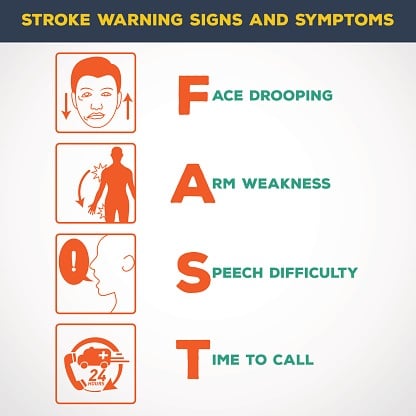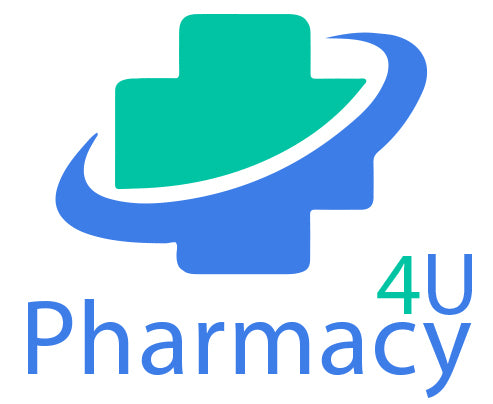Could you recognise someone suffering a stroke?
Knowing how to recognise the early warning signals might be the difference between life and death for you or a loved one.

What exactly is a stroke?
When the blood supply to the brain is cut off, a stroke occurs. A blood clot or blocked artery is the cause of this in roughly 80% of instances. Strokes can also occur when a blood artery is injured. The brain cells do not obtain the oxygen they require if their blood flow is inadequate. The brain cells will die if the supply is cut off for long enough.
The consequences of a stroke are determined by the length of the interruption. When a blood artery is briefly stopped, a mini-stroke or transient ischemic attack (TIA) occurs. As the blood flow restores, the symptoms may fade quickly, and there may be little lasting harm to the brain cells. Even if the symptoms go away on their own, a TIA might signal the onset of a more serious stroke, so it's crucial to take them seriously and get care. A stroke occurs in around 4 out of every 10 patients who suffer a TIA.
Because of the damage to the brain cells, a massive stroke can produce very significant symptoms, including long-term issues. If you don't seek care right away, a stroke might be fatal. The sooner you seek assistance, the higher your chances of making a full recovery.
Who is in danger?
A stroke may happen to anybody, although some people are more susceptible than others. It's critical to understand if you're at increased risk so you can recognise the warning symptoms. Although you may not be aware if you have a compromised blood artery that might burst, other stroke risk factors can be identified and typically altered.
A blood clot or obstruction in the blood arteries feeding the brain causes the majority of strokes. Fortunately, many of the variables that raise the risk of these blockages are under our control, so you may take actions to lower your risk.
You are more likely to have a stroke if:
- You are overweight
- You have a cigarette habit.
- You're a heavy drinker.
- Your cholesterol is elevated.
- You have a high blood pressure.
- You have diabetes or atrial fibrillation, among other illnesses.
Many of these risks can be reduced by eating a well-balanced diet, exercising regularly, and leading a healthy lifestyle.
If you want to learn more about your stroke risk, speak with your doctor or schedule a health check. Online Pharmacy 4U can aid you with your identified or potential diabetes issues by providing testing equipment as well as tablets and various treatments for all our treatments available for diabetes you can visit our Diabetes Page. Having your blood pressure, cholesterol levels, and other indicators tested might help you determine if you're at risk for a blood clot or a blocked artery that could lead to a stroke.

How Can You Recognize Early Warning Signs?
You may be familiar with the acronym FAST. It's a quick and easy approach to recall the most frequent stroke warning symptoms and the significance of acting quickly:
- Face sagging (if you ask them to smile then it will be crooked or one-sided)
- Arm numbness or weakness (if you ask them to lift both arms, one will drop lower than the other)
- Slurring or trouble repeating a sentence are examples of speech issues.
- Time to call an ambulance.
However, there are also more potential signs to be aware of:
- A tremendous headache that appears out of nowhere
- Dizziness, lack of balance or coordination that occurs suddenly
- Loss of eyesight or alterations in vision in one or both eyes, which generally occurs unexpectedly.
- Feeling perplexed or having difficulty comprehending things that are normally simple for you
- On one side of the body, numbness or weakness (or in one arm or leg)
Why It's Important & How to React
If you or someone else thinks they're suffering a TIA or a stroke, get medical attention straight away. A stroke is considered a medical emergency, and the sooner you receive care, the better. Call and ambulance right away and inform them that you believe they are having a stroke. Remember that even if the symptoms go away, you should still go to the hospital since it might have been a mini-stroke.
The therapy you receive will be determined by the type of stroke you have, the afflicted area of the brain, and the severity of your symptoms. The first goal will be to restore your brain's blood flow. A blood clot can occasionally be dislodged with drugs, but in certain cases, surgery is necessary. The sooner you receive this treatment, the better the outcomes will be.
After the immediate threat has been addressed, you will most likely require long-term care to avoid more strokes and aid recovery. You may require medicine to avoid blood clots or to lower your blood pressure. To enhance the blood circulation to the brain, surgery is sometimes indicated. Any long-term affects, such as speech or movement issues, may necessitate additional assistance. The sooner you seek treatment, the easier it will be to treat you and the less likely you will suffer long-term consequences.
Do you think you're more prepared to deal with a situation like this now? And without looking back, can you recall what FAST stands for?

Our Happy Customers
Rated Us for our Service Excellence
 Dispensed by Regulated UK Pharmacists
Dispensed by Regulated UK Pharmacists

 How it works
How it works Help
Help Account
Account
 Basket
Basket



